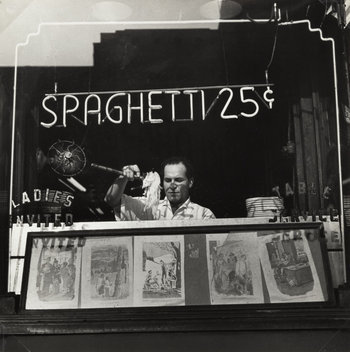The Paris Review's Blog, page 888
September 11, 2012
Letter from Portugal: Sonnets from the Portuguese
Dollhouse with Portuguese tile, Museu Do Brinquedo Sintra.
You will have heard of Sintra. A stunning enclave some forty minutes outside Lisbon, filled with palaces and piles and follies of every era, Lord Byron called it “Glorious Eden,” and started “Childe Harolde” at Lawrence’s Hotel, on the Rua do Consiglieri Pedroso. (There is now an Escadinhas Lord Byron just outside its doors.) Tourists have been flocking there ever since.
We visited the Palácio da Pena with its majestic views, and the pink-hued Palácio Seteais, and the fourteenth-century Palácio Nacional de Sintra and the Gothic pleasure gardens of the Regaleira Estate, rich with grottoes and gargoyles and secret passages. We ate at the Queijadas de Sintra. It was very much the Lucy Honeywell school of tourism, but wonderful all the same. We were part of a multinational throng. I was vaguely aware of being a failure as someone who experiences life to the full, and probably the worst kind of American imperialist to boot. I studied my vocabulary list diligently.
In the afternoon, I visited the Toy Museum, lured by the sight of a six-foot Playmobil woman beckoning me in from a wrought-iron balcony. Some visitors seemed disappointed by the somewhat haphazard collection (“Where are the teddy bears?” demanded one disconsolate British tourist. “Where are the rocking horses?” implored her companion.) Read More »
The “American Idol of Microfiction” Gets a New First Prize
How fast can you tell a good story? Three times a year, NPR’s “Three-Minute Fiction” challenges listeners to send in the best stories they can write—and read out loud in less than three minutes. So far, more than 45,000 contestants have taken the challenge. It is, in the words of host Guy Raz, the “American Idol of microfiction.”
This Saturday kicks off a new round of “Three-Minute Fiction” with guest judge Brad Meltzer. And with a new first prize—publication in The Paris Review. That’s right: the winner will appear in our Winter issue. So sharpen your pencils, eliminate your unnecessary words, and get ready to write.
Click here for details—then tune in to All Things Considered this Saturday (5 P.M. EST) to hear the rules for the latest round.
September 10, 2012
1, Love
At its best, my slice backhand follows the flamboyant path of a violin virtuoso’s bow striking the climactic note of a concerto—from above my right shoulder plucked diagonally down to my left shoestring. The ball’s tone is a hollow pok on hard courts and a chalky chh-chh on clay that dies on the second bounce. All these dramatics—mere vestiges of a time when I wanted to impress Angela, my middle school crush.
Angela played number one singles on the undefeated coed spring team at our private school in Princeton, New Jersey. Her long Italian American locks springing along with her high jumping-forehand, her second serve ball tucked in the spandex beneath her pristine tennis skirt—she was a vision of beauty to watch. Her movement around the court traced the Etch A Sketch path of someone fully in control of the game’s portrait.
In Lolita, Humbert Humbert describes how Dolores Haze plays singles at least twice a week with a classmate, Linda Hall, employing teasing tactics against her and “toying with [her] (and being beaten by her).” The particular beauty of Dolores's tennis game is, for Humbert, a prerequisite for an amenable afterlife, or so he whimsically hyperbolizes one crisp afternoon as Dolores plays in Colorado: “No hereafter is acceptable if it does not produce her as she was then, in that Colorado resort between Snow and Elphinstone, with everything right …”
Letter from an Airplane
Liane de Pougy, Paris, 1890s.
Dear Friends,
There are moments I suspect we are not living in the Golden Age of Travel.
I speak as someone who enjoys nearly everything, mind you, from the novelty of sipping in-flight tomato juice to the thrill of meeting the passenger in the next seat. But even I (a half-wit, apparently) found last Tuesday’s flight to Portugal less than easy going.
We cut it close; my traveling companion, Matthew, was late to meet me and the result was the sort of last-minute dash that’s both exhilarating and draining. I was allowed in an accelerated line for irresponsible travelers but found myself behind a man who not only seemed in no hurry but had to remove three pieces of heavy jewelry, one at a time, each time the metal detector went off. He did so with an infuriatingly sanguine smile. I hated and envied him. Passengers were boarding when I sprinted up, some ways ahead of Matthew. The gate, C71, and the plane were absolutely crammed with some forty assorted kids, ranging in age from about eleven to fifteen. One of their chaperones, a hearty lady in a tracksuit, explained to me they were on their way from Indiana to an international cheerleading competition three hours outside of Lisbon. When I arrived at 29A (aisle) I discovered the middle seat, intended for my traveling companion, was occupied by a tween of some thirteen years. She and her friend regarded me with terrified bravado. “If you’re sitting here,” one of them said quickly, “you should know that we have to sit together. We’re roommates.”
September 7, 2012
Sheila Heti, Toronto, Canada
A series on what writers from around the world see from their windows.

Can you see that beautiful shrub? It has no bald patch, right? That’s because the shy, moustached, Portuguese man, who seems to live in that house alone, has spent the last six years standing in front of the hedge, where there was, for so many years, a bald patch. He’d stand before that patch, staring down at it for hours every day, even in the wintertime. When I’d come home from my errands and lock my bike to the pole, he would be there. When I went outside to check my mail, or if I looked up over my laptop, he would still be there.
At first I thought he was crazy. Then I began to think of him as more profound than other men. Why should we look at everything all around us? There is enough in a shrub.
This summer, the patch filled itself in. I guess he knew all along that it was not lacking water or fertilizer or chemicals or conversation. All it wanted was his attention. Now he stands at another empty patch.
I sit in a room lined with books, at a round, teak dining table, on the second (top) floor of a Victorian house. He stares at his shrub as I stare at my computer. His body faces me and mine faces him. Our bodies are opposite each other every day, and we stare at things, and wait for the emptiness to fill in. —Sheila Heti
What We’re Loving: Watkins, Rothbart, Footman
So many of you have written to tell us how much you loved Davy Rothbart’s true story “Human Snowball,” in our current issue. Now you can get a whole book of his adventures. That’s right: his collection My Heart Is an Idiot goes on sale this week. —Lorin Stein
I just gulped down Claire Vaye Watkins’s debut collection Battleborn, and it’s the best fiction from the recent American West I’ve encountered east of Stegner. (See Paris Review issue 195 for the debut of Watkins’s story “Goldmine,” here retitled “The Past Perfect, the Past Continuous, the Simple Past.” —Samuel Fox
I am currently on vacation, and my travel companion has been reading David Footman’s 1936 cult novel Pig and Pepper. The story of a young English bureaucrat stationed in the Balkans, it’s funny, fresh, very British, substantive—in short, the sort of book you want to recommend to everyone you know. Footman was an accomplished spy and went on to a distinguished career as a public servant, but in a just world, this forgotten novel alone would be enough to make his name. —Sadie Stein
Introducing Our Fall Issue!
We all hate to see summer end, but don’t despair: we bring you our Fall issue by way of consolation! And there’s so much to love.
James Fenton on journalism, shrimp farming, interior decoration, gardening, poetry, opera, and more:
What I had got from my teaching experience in the Midwest was a feeling for the enormous pressure on people in the poetry world to conform to an entirely negatively defined notion of poetry. It doesn’t rhyme, it doesn’t have any rhythm one might detect, and it isn’t written for the ear but rather the page. It seemed de-natured. These poets had forgotten the lips and the limbs, the dance, the whole bodily element—that had been banished. The manifesto was a piece of devil-may-care. It was actually anti-Iowa rather than anti-American.
Roberto Calasso on life, film, and publishing—Italian-style:
The publisher after all is considered, especially in Anglo-Saxon countries, a rather eccentric entrepreneur or impresario—a businessman in a very improbable field. But, if he is successful, then he is a good businessman. The author is the successor of the saint, everyone respects the author. So to put the two elements together is highly suspicious in a way, especially in the rather moralistic Protestant countries. In the Latin countries, less so.
Plus! Fiction by Jim Gavin, David Gordon, Ottessa Moshfegh, Peter Orner, and Sam Savage. Poetry by August Kleinzahler, George Seferis, Bernadette Mayer, Jason Zuzga, and Guillaume Apollinaire. A portfolio by Daniel Handler and Maira Kalman, and collages by Jess.
September 6, 2012
Letter from India: The Haunting
 “I think this hotel is haunted,” I told my traveling companion, Clancy.
“I think this hotel is haunted,” I told my traveling companion, Clancy.
I have never said anything quite like that before. Now, I have unconventional beliefs. I believe when others tell me they have seen a ghost, particularly if they have details—say, a long nose and a tuxedo, or a suggestion from an old lady that we “touch now, dearie.” But it still sounds like crazy talk. I am aware of that.
“You’re right,” he said.
“Really?”
Then we were both afraid to turn out the light. We were in the Rajmata Suite, where the woman who lived in the hotel used to sleep, back when it was a home. Actually, the correct word is palace. When you turned out the light it was pitch black in the room. In that darkness, I felt—briefly—a unique dread. It was not a menace. Just a funny intimation. To put it into words is to coarsen what was fine: an intimation that one day I would die.
Letter From India: The Haunting
 “I think this hotel is haunted,” I told my traveling companion, Clancy.
“I think this hotel is haunted,” I told my traveling companion, Clancy.
I have never said anything quite like that before. Now, I have unconventional beliefs. I believe when others tell me they have seen a ghost, particularly if they have details—say, a long nose and a tuxedo, or a suggestion from an old lady that we “touch now, dearie.” But it still sounds like crazy talk. I am aware of that.
“You’re right,” he said.
“Really?”
Then we were both afraid to turn out the light. We were in the Rajmata Suite, where the woman who lived in the hotel used to sleep, back when it was a home. Actually, the correct word is palace. When you turned out the light it was pitch black in the room. In that darkness, I felt—briefly—a unique dread. It was not a menace. Just a funny intimation. To put it into words is to coarsen what was fine: an intimation that one day I would die.
Radical Chic
Ida Wyman, “Spaghetti 25 Cents.” New York. 1945.
One day in late March, I took some pictures of the crowds of protestors in Union Square, newly arrived from Zuccotti Park. The week before, more than seventy protestors had been arrested, and the Union Square encampment evicted in a fashion many Occupiers described as gratuitously violent. Ramarley Graham had been killed about a month before, and the racially-charged practice of stop-and-frisk was asserting itself into mainstream consciousness. Trayvon Martin was now a household name. And since the previous August, one revelation after another had surfaced about the NYPD’s secret Muslim surveillance program. So people gathered on March twenty-fourth.
Tall, glittery women milled about with signs that proclaimed Social Justice is Fabulous!, at one point posing for a picture with veteran progressives whose cardboard read Protesting is not a crime it is a right!. One man held a white square above his head with red Chinese characters and their English translation in black: PROTECT HUMAN RIGHTS. PEACE FREEDOM DEMOCRACY. A LONG WAY TO GO. A young guy pontificated, a lit, dripping, hand-shaped candle his microphone. A “naughty policewoman” balanced on ice-skated toes, legs angled and baton in hand, her sign saying something about police wiping their collective ass with the Constitution. Former Police Captain Ray Lewis promoted the documentary Inside Job, while the Hare Krishnas, gathered in the square as usual, sang and danced in full force.
These pictures, I didn’t realize at the time, would be lost. Innocent of their fate, I took photographs that day as most people do, with the idea that this was not a test.
Thirty minutes after leaving Union Square, I arrived at the Jewish Museum, where The Radical Camera: New York’s Photo League, 1936-1951 was on view for its last day in New York City. (The exhibit is currently at the Columbus Museum of Art, Ohio, set to travel to San Francisco and West Palm Beach.) And while the sparse grandeur of Museum Mile was in contrast to the teeming crowd of Union Square, the trajectory felt logical.Read More »
The Paris Review's Blog
- The Paris Review's profile
- 305 followers










